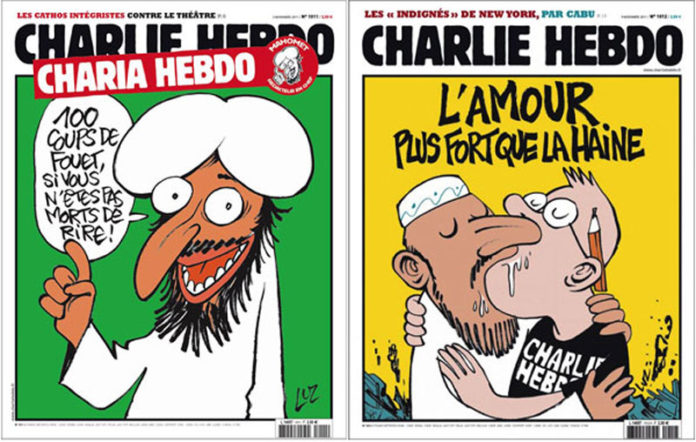“It might sound a bit pompous to say,” Stéphane “Charb” Charbonnier, editor of France’s satirical Charlie Hebdo, told Le Monde in 2012, “but I prefer to die standing than live on my knees.” The interview was conducted as the newspaper was once again publishing cartoons of the Prophet Mohammad, something it had already been sued, hacked and firebombed for by Islamic extremists in previous years. Charbonnier, and the staff knew they might one day be victims of terrorism to silence them, but they refused to surrender their rights to intimidation from armed thugs or those in the government.
The savagery of the assassination of those on Charlie Hebdo staff, as well as the symbolic nature of the target, was an unequivocal message of war against not just those who “insult Islam,” but the very pillar of free expression – a principle that holds the West above societies founded on fear and repression. “Je Suis Charlie!” [translated: “I am Charlie”] became the rallying cry for not just the 1.6 million people, including 40 world leaders, who marched through the streets of Paris in solidarity against extremism last weekend, but millions around the world as well.
Of course, like most cause célèbre that involve a popular, feel-good position, bleeding-heart liberals could not wait to jump on the “Je Suis Charlie” bandwagon; to pound their chests and declare how much in favor of free speech they are. The irony is, these chest-pounders are the ones stifling that very freedom here in the United States. Thanks to the insidious and continuing creep of political correctness rampant in governments at all levels, and especially in academia, rarely has it been so dangerous to express oneself in America.
The Left likes to pretend to support free expression, but rather than fight speech that is ignorant, hateful, or unpleasant with, say, more speech, it seeks to silence that speech with threats of lawsuits, or worse, outright criminalization. Today, people are going to jail for composing rap music on social media as a means to cope with a divorce (a case currently being decided by the Supreme Court). At supposedly “prestigious” institutions of higher education, we have trigger warnings for objectionable content so students are not “offended”; even codifying the words college students must use to legally engage in sex without risk of being accused of “sexual harassment.”
To cap it all off, a study conducted last year found that 51 percent of Democrats favor the criminalization of “hate speech.” Given the strong, anti-expression forces at work here at home, it is strange that so many liberals feel compelled to support the work of a foreign newspaper they would have condemned only a few weeks ago.
For example, New York Democrat Rep. Hakeem Jeffries posted to Twitter following the Paris terror attack: “We all stand with the people of France in the face of terror. Vive la liberté.” Yet, last year, Jeffries sponsored a bill that would have mandated the federal government study “hate speech” on the Internet, which the Washington Times described as “the latest effort to deputize the federal government as the online speech police.” Jeffries then went a step further and used the Paris attacks as further justification for fully funding the Department of Homeland Security, another federal agency that places the rights of Americans at the bottom of its priority list.
It is this duplicitous attitude about free speech that has allowed the culture of political correctness to take hold as it has; and all without needing to fire a single bullet.
In the immediate aftermath of 9/11, President George W. Bush visited Ground Zero, where he stood on top of a fire truck and shouted through a bullhorn to the first responders trying to clear the still-smoldering rubble of the Twin Towers: “I can hear you! The rest of the world hears you! And the people — and the people who knocked these buildings down will hear all of us soon!” For all of his faults, President Bush, if just for a few seconds, captured the true essence of the American spirit in that moment; unbroken and unyielding to the powers that try to destroy it. His impromptu and unscripted speech also had a much more significant meaning than merely reassuring the people of New York that the nation was with them. It also said, loudly and clearly, that American freedom – our freedom — will never be silenced by the actions of our enemies. Unfortunately, far-reaching laws passed, and executive policies implemented in the aftermath of 9-11, have severely dimmed Bush’s lofty words and sentiments.
As we move forward from the Paris attacks, we must ask ourselves if truly we are prepared to defend free expressions from all its enemies, not just against those who use guns, bombs, and planes. Clever hashtags, symbolic profile pictures, and public demonstrations in support of French cartoonists are popular right now, and are easy steps to take; but these are superficial, quickly forgotten, and easily pushed aside. The real test comes when we look in the mirror and see how the silent killer of political correctness and soft censorship here at home is destroying and chilling free speech at a far deeper substantive level than a couple of terrorists are able to do: “Today we are Charlie Hebdo,” writes Nick Gillespie at Reason. “But what about tomorrow, and the day after tomorrow?”





























